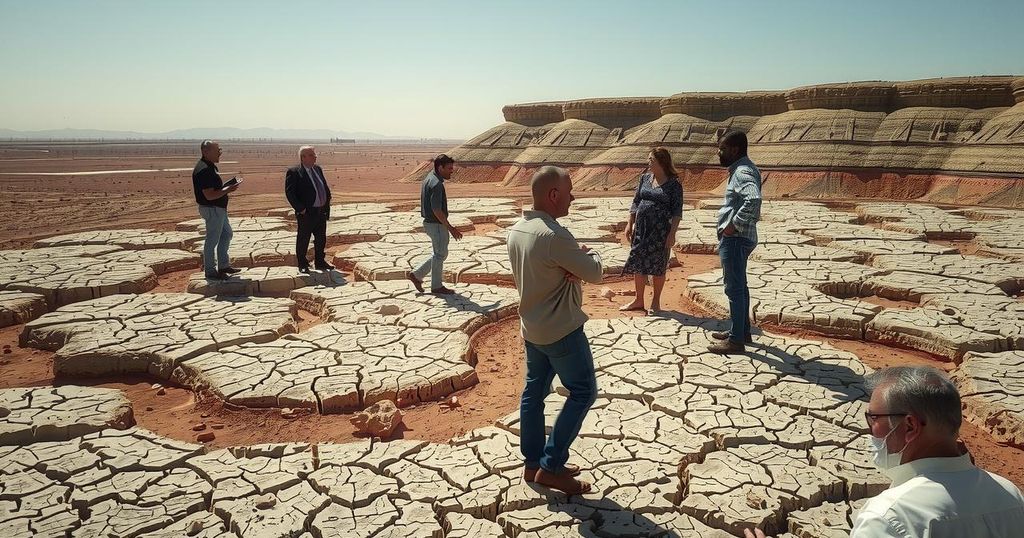Global Leaders Convene to Tackle the Crisis of Land Degradation and Drought

A UN report highlights that over 75% of Earth’s land has become drier, prompting nations to convene in Riyadh to discuss solutions for desertification and drought management. The summit aims to address the looming crisis affecting billions by fostering cooperation and securing funding for vulnerable areas. Measures suggested include improving water management and adopting sustainable agricultural practices to combat the rising threat of aridity.
Earth’s landscapes are increasingly succumbing to aridity, significantly impacting both plant and animal habitats globally. A recent report from the United Nations, unveiled during discussions in Riyadh, Saudi Arabia, highlights that over 75% of the world’s land experienced drier conditions between 1970 and 2020 compared to preceding decades. The summit is centered on combating desertification, exacerbated by climate change, rain scarcity, and deforestation. Ibrahim Thiaw, a UN official, emphasized that the changing climates compromised by human influence are irrevocable, reshaping ecosystems on Earth.
During these talks, which commenced last week and conclude on Friday, leaders are striving to devise strategies to manage droughts—temporary but severe water shortages—and the permanent degradation of land. The consequences of prolonged droughts could soon affect an estimated five billion individuals by the end of the century, impacting ecosystems, agricultural productivity, and food security. Furthermore, arid conditions contribute to increased migration and heightened economic challenges, especially in regions such as southern Europe and the Middle East.
Efforts at the Riyadh summit are primarily focused on consensus regarding drought response funding, with disagreements about whether affluent nations should support global drought initiatives financially. Significant commitments include Saudi Arabia’s pledge of $2.15 billion and an additional $10 billion from the Arab Coordination Group to assist vulnerable countries. However, the UN estimates droughts have historically resulted in global costs amounting to $125 billion between 2007 and 2017.
Long-term adaptability measures are essential to mitigate the consequences of ongoing droughts. While recovery is possible, Thiaw urged for significant shifts in climate policies. Enhanced land use practices, improved irrigation efficiency—like implementing drip irrigation systems—and large-scale reforestation are crucial recommendations outlined in the UN report. Andrea Toreti, a principal author of the report, underscores the need for unified global actions to sufficiently confront the growing challenges of climate change and its impacts on land.
The issue of land aridity is a critical global concern, driven by climate change, deforestation, and water scarcity. The United Nations report presented at the summit in Riyadh indicates alarming trends in the degradation of fertile land. With rising temperatures and changing precipitation patterns, vast areas of once-productive land are becoming increasingly inhospitable to flora and fauna. Addressing this concern requires international cooperation and a multifaceted strategy that encompasses water management, agricultural practices, and climate policy reforms. The summit serves as a platform for world leaders to negotiate potential solutions and funding mechanisms for combatting desertification and ensuring a sustainable future for affected regions. The widespread implications of declining land health extend beyond agriculture, impacting food security, economic development, and human migration patterns, necessitating urgent and cooperative action.
In conclusion, the ongoing dialogue at the UN summit in Riyadh underscores the urgency of addressing the significant challenges posed by land aridity and desertification. With over 75% of the planet’s land experiencing heightened dryness, the ramifications for global populations, food security, and ecosystems are profound. Increased funding commitments herald a willingness to confront these challenges. However, sustainable long-term strategies, improved agricultural practices, and concerted efforts to manage water resources are essential to facilitate meaningful adaptation and promote resilience against climate change.
Original Source: apnews.com






